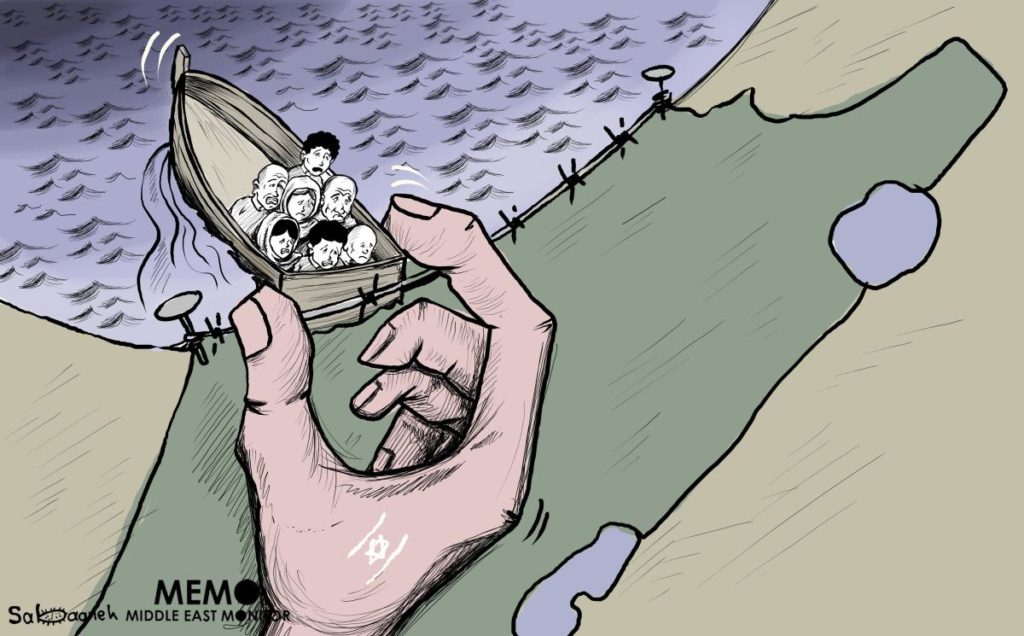Recent attacks carried out by armed individuals in the Gaza Strip reflect the growing public anger of Israel’s 12-year blockade on the Palestinian territory, analysts told Anadolu Agency.
Analysts opine that lifting the crippling siege and improving livelihood in Gaza will lead to halting attacks from the coastal enclave against Israel.
“The unorganized individual operations along Gaza border is a natural reaction to the absence of any political or economic horizons, and to the ongoing blockade on the Gaza population,” Palestinian political analyst Hossam al-Dajani told Anadolu Agency.
“Those who are carrying out these operations are suffering from the tragic reality in Gaza,” he said.
Since early August, there have been a series of deadly incidents on the ground along Gaza-Israel border.
Three Palestinians were shot dead by Israeli forces stationed along border, with the military claiming that the three were planning to carry out attacks against Israel.
The killings came a few days after the army said its forces had killed four armed Palestinians along the security fence between Gaza and Israel.
On August 1, the Israeli army said a Palestinian seeking to avenge his brother’s death by Israeli fire was killed when he entered Israel from Gaza and opened fire on soldiers. Three soldiers were wounded in the incident.
Israeli warplanes also carried out several airstrikes in the Gaza Strip in response to rocket fire from the besieged Palestinian territory.
Israel imposed a crippling blockade on the Gaza Strip in 2007 after Palestinian group Hamas seized control of the strip from its rival group Fatah, negatively affecting the lives of the 2 million people trapped in the Palestinian enclave.
Palestinians have been staging weekly protests near the Gaza borders, since March 2018, to demand an end to the Israeli siege on the strip that has deprived its inhabitants of their basic human rights.
Public Anger
Al-Dajani warns that the situation could escalate, if Israel fails to comply with cease-fire understandings made with the Palestinian resistance factions.
“If the international community failed to put an end to Israel’s procrastination on implementing the cease-fire understanding, the individual operations might escalate to include the use of rockets instead of small arms against Israeli patrols near the border,” he said.
He believes that lifting the Gaza blockade and improving the living conditions in the territory will help halt such attacks.
“Maintaining the Israeli policies on Gaza means an escalation of the individual operations to reach the point of an all-out military confrontation,” he warned.
The analyst, however, rules out that Hamas, which rules the Gaza Strip, was behind the individual attacks.
“If Hamas was responsible, it would have carried out them in a way that would have caused heavy losses among Israeli forces,” he said.
“It is clear that these operations were carried out by individuals as a result of the difficult living and economic conditions in Gaza,” he added.
Political analyst Talal Okal agrees that the individual operations might be the result of the miserable conditions in Gaza.
“It is also possible that Hamas had allowed its members to carry out these operations without claiming responsibility in an attempt to express its anger over Israel’s failure to abide by the cease-fire understandings,” he said.
Hamas and Israel have reached an informal cease-fire in May after the worst bout of violence since 2014.
Imminent Explosion
Okal believes that the recent operations might be a “message” by Hamas to Israel that it would not be able to calm the situation in Gaza as long as Tel Aviv failed to abide by the cease-fire understandings.
“Deterioration of the political, economic and humanitarian situation in Gaza could lead to insecurity and a security vacuum, which would pose a real threat to Israel,” he said.
The Palestinian analyst thinks that Israel might escalate its response to the individuals attacks in Gaza after next month’s general election.
Political analyst, Ibrahim al-Madhoun, warns of an imminent explosion of the situation in Gaza, stating “The unplanned and unorganized resistance might be a popular option that no one can stop, in case the Israeli policies against Gaza continued.”
Source : Days of Palestine/Anadolu
Edited for IMEMC : Ali Salam


